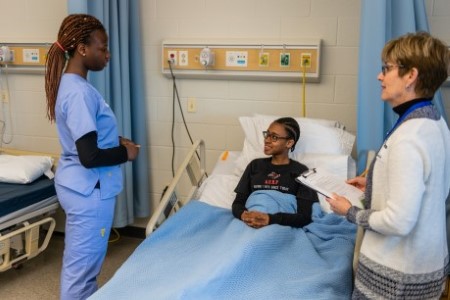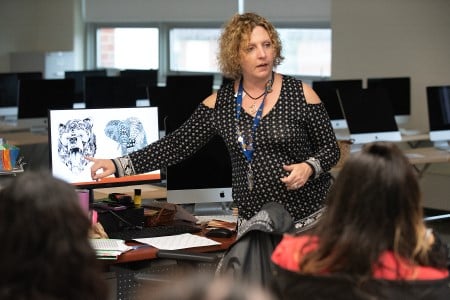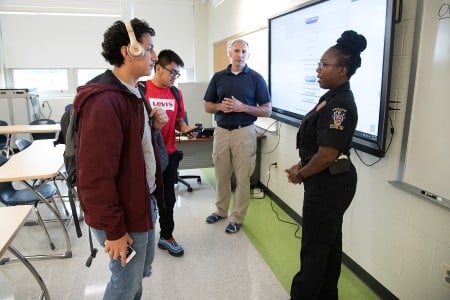Human and Consumer Services Cluster
- The Hospitality and Tourism Management Program - Mr. Potyk and Ms. Daniels
- Cosmetology - Ms. Quan and Ms. Garcia
- The Academy of Health Professions - Mr. Aguiluz, Mr. Khan, Ms. Zehner, Ms. Ostry
- Restaurant Management/Culinary Arts - Chef Kerchner and Ms. Wilson
- Graphic Design - Ms. Arroyo
- Law Enforcement and Leadership - Mr. Murphy
- Network Operations - Mr. Hegler
- Cybersecurity - Mr. Cetiner

The Hospitality and Tourism Management Program (HTMP)
The Hospitality and Tourism Management Program (HTMP) is a nationally recognized program that was developed by industry experts and members of the American Hotel and Lodging Association. It’s industry-developed curriculum prepares students for roles in the hotel industry and beyond. The tourism industry offers significant job creation across all regions and has long been an industry with tremendous success for long-term career pathways. Tourism is recognized as a major driver of economic growth and development.
The HTMP Career and Technology Education program consists of four components that students are required to complete: three in-school courses; an industry-mentored, work-based learning experience guided by the American Hotel and Lodging Educational Institute (AHLEI) competency checklist; two AHLEI end-of-course examinations; and the Certified Hospitality and Tourism Management Professional credential.
Students enrolled in the program must complete 100 hours of an industry-mentored work-based learning experience in a hospitality and tourism establishment. The work-based learning experience or internship is coordinated through the internship coordinator at the home high school. The internship is guided by the HTMP Competency Checklist and Montgomery County Public Schools internship requirements. The competencies reflect what employers have identified as being integral to success in the industry and represent portable, transferrable skills that will be of value in many different work environments. The internship may be completed during the Summer Internship course. Working in collaboration with students from the Professional Restaurant Management program, HTMP students also learn about the operation of a full-service restaurant, Café Edison, open each spring.
In addition to the Certified Hospitality and Tourism Management Professional credential, students in this program have the opportunity to earn the industry-recognized ServSafe Food Protection Manager Certification. Students who meet all of the requirements may enroll in a college-level course during their senior year of high school.
Licenses & Certifications:
- Hospitality and Tourism Management Professional Certification
- ServSafe Food Protection Manager Certification
Program Highlights:
- Students serve as Thomas Edison’s tour guides.
- Students apply learned theory and skills during authentic internship experiences.*
- *Note- the internship experience will be coordinated through the internship coordinator at the home high school.
- Students have the opportunity to earn an industry-recognized certification.
- Students learn about the operation of a full-service restaurant, Café Edison, in the spring.
- Students earn 15 automatic SSL hours per semester with a passing grade in the course.
- Opportunity to earn college credit while still in high school (see below)
*Note: Student must achieve a passing score on the ServSafe Food Protection Manager exam taken while enrolled in the Thomas Edison course to receive a ServSafe Food Protection Manager Certificate and Food Protection Handler License.
Cosmetology
The Cosmetology program focuses on the science and techniques of personal beauty care, with an emphasis on hair, skin, and nails. Cosmetology is Thomas Edison's only three- year program, and students must enter as rising sophomores (10th grade). Students using this course as their high school Career and Technology Education program of study completer must sit for the Maryland State Board of Cosmetologists Licensing Exam at the end of their third year in the program. The instructional emphasis in this program includes hygiene, sanitation and safety, salon management, and the Maryland State Board of Cosmetology rules and regulations. Students learn concepts and skills related to anatomy and physiology, mathematics and measurement, and chemistry. It is through course work, lab projects, and clinical experience that students are able to earn the 1,500 clock hours required to become eligible to earn graduation credit and take the Maryland State Board of Cosmetologists Licensing Exam (both the Practical & Theory parts).
Students have opportunities to apply the skills and techniques learned and acquire entrepreneurial skills through managing and operating the in-school Edison Salon. Community members schedule appointments and become the Cosmetology students’ salon customers. Under the guidance of the classroom instructor, who is a licensed senior cosmetologist, students are able to provide a variety of salon services including shampooing, precision hair cutting, chemical treatments, hair coloring, skin care and facials, make-up techniques, manicures, and pedicures.
Program Requirements:
- Apply during freshman year, complete program in 10th, 11th, and 12th grade
- Should be in good academic standing
- To earn program of study completer, must successfully complete 3 years of study and take the Maryland State Board of Cosmetologists Licensing Exam
Licenses & Certifications:
- Maryland State Board of Cosmetologists License
Program Highlights:
- Students apply theory and skills to clinical experiences and to the management and operation of the Edison Salon.
- Students begin the program in Grade 10; this is Thomas Edison’s only three-year program.
- Students earn 15 automatic SSL hours per semester with a passing grade in the course.
*NOTE: Students MUST complete the 1,500 clock hours required to become eligible to earn graduation credit and sit for the Maryland State Board of Cosmetologists Exam.
Academy of Health Professions
The Academy of Health Professions (AHOP) program is an exciting course providing students with the opportunity to begin their education and career in the medical field, while still enrolled in high school. Students exit the program with multiple certifications and a strong background in the sciences and practical experiences as healthcare professionals. Instruction focuses on anatomy, physiology, medical terminology, patient care skills, and current healthcare issues. Additional areas of study include medication administration, vital signs, principals of infection control, and the care of the hospitalized patient.
The AOHP program can lay the groundwork for students wishing to pursue medical school and a career as a doctor, nurse, veterinarian, therapist, or a variety of other healthcare careers.
Certifications:
- Certified Clinical Medical Assistants (CCMA)
- Certified Nursing Assistants (CNA)
- American Heart Association Basic Life Support (BLS) for Healthcare Providers
- Geriatric Nursing Assistant (GNA)
First year students complete the following fundamental courses:
- Foundations of Medicine and Health Science
- Structures and Functions of the Human Body
- Certified Clinical Medical Assistant (CCMA) course
Second year students complete the following advanced level (honors) courses:
- Medical Science with Clinical Applications course
- Guided Research course
- Internships at Walter Reed National Military Medical Center and Bethesda Health and Rehabilitation Center
The Academy of Health Professions meets the graduation requirement for completion of a career development program. Students completing the full program will earn a total of six credits. Students successfully completing the first semester of the second year school-based Medical Science program may be invited to participate in a second semester clinical rotation at a local hospital and long-term care facility.
Restaurant Management/Culinary Arts
The Restaurant Management/Culinary Arts program offers students the opportunity to explore the food service industry and acquire the knowledge and skills needed to pursue postsecondary education and careers. This program is certified by the American Culinary Federation, a professional organization that works to enhance professional growth for chefs and cooks. In a professional kitchen, students study and practice food safety and sanitation principles, professional food-handling and preparation techniques, and quantity preparation. Students participate in various entrepreneurial ventures through the operation of an in-school café, catering in-school events, and a production bake sale. Students have opportunities to earn an American Culinary Federation Certified Fundamentals Cook Certification (ACF-CFC), ServSafe Food Protection Manager's Certification, ServSafe Allergens Certification, and Montgomery County Food Handlers License.
Licenses & Certifications:
- Certified Fundamentals Cook Certification (ACF-CFC)
- Montgomery County Food Handlers License
- ServSafe Food Protection Manager’s Certification
- ServSafe Allergens Certification
Program Highlights:
- Students apply knowledge and skills to the operation of the Edison Holiday Bake Sale in the fall and Café Edison in the spring.
- Students earn 15 automatic SSL hours per semester with a passing grade in the course.
- Opportunity to earn college credit while still in high school (see below).
Montgomery College Articulations:
For all articulations, the student must earn an “A” or “B” in each semester course of the program to be eligible for credit. Some articulation agreements have additional requirements.
Edison Semesters Montgomery College Courses Articulated
2 semesters HMGT 105 Food Service Sanitation (1 credit)*
*Note: Student must also achieve a passing score on the ServSafe Manager exam taken while enrolled in the Edison course to receive a ServSafe Manager's Certificate and Food Handlers License.
Graphic Design
Graphic Design's unique and inspiring program prepares students interested in college studies and careers in the arts, media, and communication industries. Students gain a wide and solid foundation in graphic design, digital imaging, and print-related skills.
The Graphic Design students use the latest in computer technology, as well as the latest programs related to design & production and digital imaging; leading to skills in photo editing, presentation, illustration & drawing, and multimedia and web design. Thomas Edison's Graphic Design program offers certification through the national accreditation and certification program, PrintEd. Through testing, students may earn certifications in Introduction to Graphic Communication and Graphic Design. Thomas Edison is also a Certiport certified testing facility for Adobe products. Additionally, students may also gain college credits through articulation agreements with select colleges and universities.
Licenses & Certifications:
- Level I: PrintEd Introduction to Graphic Design
- Level II: PrintEd Graphic Design – Adobe Illustrator, Adobe Photoshop (optional and at cost)
Program Highlights:
- Students have the opportunity apply learned theory and skills by participating in special project competitions such designing Café Edison’s menus and SkillsUSA pin and t-shirt design.
- Students earn 15 automatic SSL hours per semester with a passing grade in the course.
- Opportunity to earn college credit while still in high school (see below).
Montgomery College Articulations:
For all articulations, the student must earn an “A” or “B” each and every semester to be eligible for credit. Some articulations have additional requirements.
Edison Semesters Montgomery College Courses Articulated
2 semesters (Level 1) GDES 116 Digital Tools for the Visual Arts (4 credits)
2 semesters (Level 2) GDES 121 Fundamentals of Graphic Design 1 (3 credits)**
** NOTE: For GDES 121 credit, Students must also pass the PrintEd Certification exam.
Law Enforcement and Leadership is a triple period course focused on introducing students to the guiding principles of public safety and law enforcement. The course will provide students with many hands on experiences through the use of simulations, structured debates, and inquiry projects. In collaboration with the Montgomery County Police Department, experts from a variety of related criminal justice and law enforcement careers will provide students with real-life applications of course content. Leadership principles will also be incorporated in to the course as an essential component of law enforcement and public safety related careers.
In order for students to complete the program pathway and meet the CTE graduation requirement, students must complete one additional credit from an approved list of options. This may be completed either concurrently with the Law Enforcement and Leadership course or completed in the subsequent year. Students eligible for this program are juniors and seniors who have successfully completed National, State, and Local Government or Advanced Placement Government.
Program Highlights:
- Students will engage in simulations, mock trials, relevant field trips, and hands on learning about the various roles and responsibilities of law enforcement.
- Options for a fourth credit for program completion include: dual enrollment in Montgomery College course CCJS 110, independent research, or an internship.
- Program completion for qualified students provides a possible pathway for internships and/or entrance into cadet academies for Montgomery County Police Department and the Maryland State Police leading to a Criminal Justice Associate’s degree and full time employment.
- Opportunity to earn college credit while still in high school (see below).
Montgomery College Articulations:
For all articulations, the student must earn an “A” or “B” each and every semester to be eligible for credit. Some articulations have additional requirements.
Edison Semesters Montgomery College Courses Articulated
2 semesters CCJS 250 Criminal Justice Seminar (3 Credits)

Network Operations
Network Operations is an exciting course, preparing students for college information systems majors and promising technical industry certifications. In this course, students explore new technologies in PC hardware and operation systems, as well as computer networking. Students have the opportunity to earn CompTIA A+ and Network + certification, which are entry level, industry standard certifications. Students gain theoretical and practical skills and knowledge, and are able to put those skills to use in entrepreneurial experiences and community service projects.
Graduates in this program are prepared for continued college/university study in various computer science majors.
Licenses & Certifications:
- CompTIA A+ certification
- CompTIA Network+ certification
Program Highlights:
- Students have the opportunity apply learned theory and skills by working at MCPS Foundation Computer Sales.
- Automatically earn 15 SSL hours per semester with a passing grade in the course.
- Opportunity to earn college credit while still in high school (see below).
Montgomery College Articulations:
For all articulations, the student must earn an “A” or “B” each and every semester to be eligible for credit. Some articulations have additional requirements. The following courses/credits can be transferred to Montgomery College Cybersecurity A.A.S.: 356A, Network and Wireless Technologies A.A.S.: 354, or the IT Professional+ Certificate: 254.
Edison Semesters Montgomery College Courses Articulated
2 semesters NWIT 127 Microcomputer Essentials (3 credits) *
* Note: Student must also pass the CompTIA A+ 901 AND 902 Exams for NWIT 127 credit.
3rd semester NWIT 151 Introduction to Networking (3 credits) **
** Note: Student must also pass the CompTIA Network + Exam for NWIT 151 credit.
The Cybersecurity course is designed to prepare students for a challenging and rewarding career in the Cybersecurity industry. Training the workforce for Cybersecurity employment is a national priority with global demand expected to continue to rise. The course curriculum is based on Cisco Networking Academy and CompTIA national models and includes opportunities for challenging industry credentials.
Students completing this course will be well prepared for the demands of college curriculum and industry credentials and certifications. Students will master a variety of Cybersecurity skills by applying knowledge through their participation in actual and virtual exercises including preparation for Cybersecurity competitions as well as the CompTIA Security+ certification exam.
Program Requirements:
- Must have completed the following prerequisites:
- Computer Programming 1 and AP Computer Science Java, OR
- Network Operations (triple-period at Edison)
Licenses & Certifications:
- CompTIA Security+ certification
Program Highlights:
- Includes interactive, multimedia content, lab exercises and projects.
- Covers foundational topics in information security, systems security, network security, mobile security, ethics and laws.
- Builds student skills in protecting organizations from cyber-attacks using defense and mitigation techniques.
Montgomery College Articulations:
For all articulations, the student must earn an “A” or “B” each and every semester to be eligible for credit. Some articulations have additional requirements.
- This course can serve as a Capstone course for the MCPS Computer Science/Code.org® Program of Study. In this Program, up to nine credits may be transferred to Montgomery College’s Computer Science Track, Computer Science and Technologies AA:107; Information Systems Track, or Computer Science and Technologies AA: 109.
- For students in Network Operations Program of Study, up to six credits may be transferred to Montgomery College’s Cybersecurity A.A.S.: 356A or Network and Wireless Technologies A.A.S.: 354.
► Specific course information and details to be released.
Learn More:







